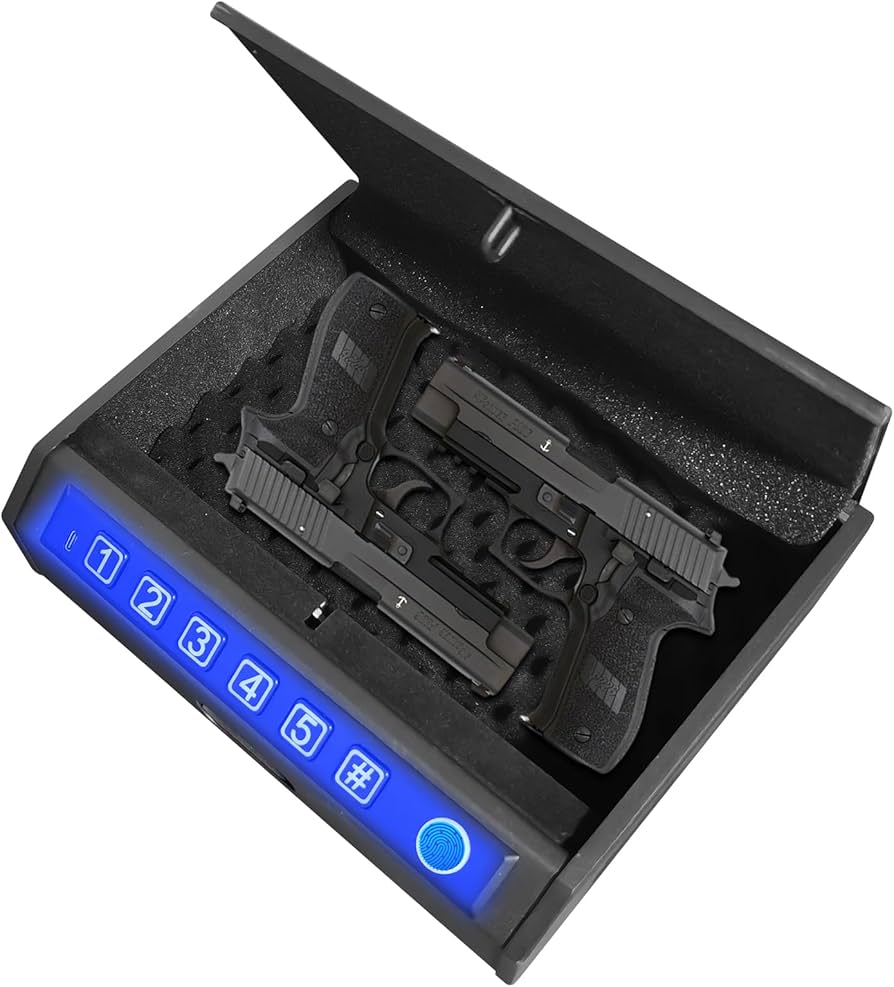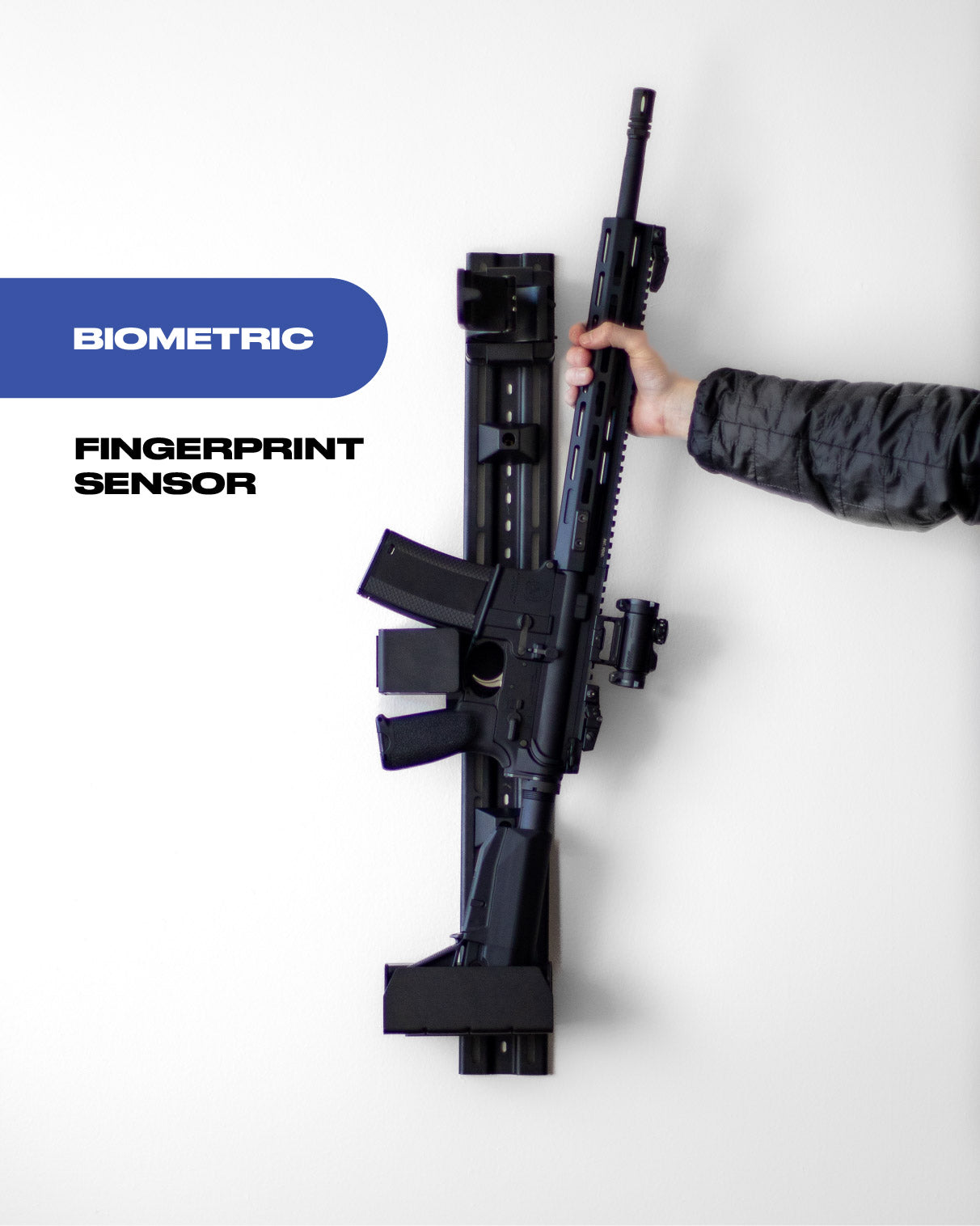When it comes to keeping your firearms secure, you want a safe that offers both advanced technology and reliable backup options. If you’re considering a biometric rifle safe, you might be wondering: do these high-tech safes support mechanical backup keys?
This question matters because technology can sometimes fail, and having a backup could save you from frustrating moments when you need quick access. You’ll discover how biometric rifle safes handle mechanical backups, why this feature is crucial, and what you should look for to keep your guns protected without compromise.
Keep reading to make sure your investment in security truly has your back.

Biometric Rifle Safes Basics
Biometric rifle safes offer a smart way to protect firearms. They use fingerprint technology for quick access. This technology adds a layer of security beyond traditional locks. Understanding the basics helps you choose the right safe for your needs.
These safes combine modern tech with practical design. They keep rifles secure while allowing fast entry. Learning how they work and their common features is important. It helps you decide if a biometric safe fits your security plan.
How Biometric Locks Work
Biometric locks scan and recognize fingerprints. They store authorized prints in the safe’s memory. When a registered fingerprint touches the scanner, the lock opens. This process is fast and usually takes less than a second.
The scanner uses sensors to read fingerprint patterns. It checks for unique ridges and valleys. Only matched prints can unlock the safe. This reduces the risk of unauthorized access.
Common Features Of Rifle Safes
Rifle safes often have solid steel construction. This protects against break-ins and fire. Many models include backup key options for emergencies. They may also feature interior lighting for easy access in the dark.
Other features include adjustable shelves and soft lining to protect firearms. Some safes offer multiple user profiles. This allows several people to access the safe with their fingerprints.
Mechanical Backup Keys Role
Mechanical backup keys play a vital role in biometric rifle safes. They offer a reliable way to access the safe when the biometric system fails. Power loss, sensor issues, or user error can prevent electronic access. Backup keys ensure you can still open your safe without stress or delay.
Purpose Of Backup Keys
Backup keys provide a manual option to open the safe. They act as a fail-safe for emergencies. If the biometric scanner stops working, the key lets you get inside. This helps protect your firearms and valuables. It also reduces the risk of being locked out completely.
The keys are usually small and easy to carry. They do not require batteries or software updates. This simplicity makes them very dependable. Many users feel safer knowing they have a backup plan.
Types Of Mechanical Backup Systems
There are several backup key systems in biometric safes. The most common type is the traditional key lock. It uses a physical key to turn a lock mechanism inside the safe. This system is straightforward and effective.
Another type is the tubular lock. It uses a round key with a special pattern. Tubular locks are harder to pick and add extra security. Some safes combine both types for better protection.
Some backup systems hide the keyhole behind a cover. This prevents easy access by intruders. Others place the keyhole in a discreet location on the safe. Both designs aim to keep the backup system secure and accessible only to the owner.
Compatibility With Biometric Safes
Biometric rifle safes use fingerprint scanners for quick access. This technology offers security and convenience. But many users worry about power failure or scanner issues. Mechanical backup keys can solve these problems. Not all biometric safes support this feature. Compatibility varies by brand and model. Understanding which safes include mechanical backups helps buyers choose wisely.
Safes Offering Mechanical Backup
Some biometric safes come with mechanical backup keys. These keys allow manual entry if the fingerprint scanner fails. Brands like Barska and Vaultek often include this feature. The key slot is usually hidden to keep the safe secure. Mechanical backups add peace of mind. Users can still access their firearms without power or scanner access.
Models Without Backup Options
Other biometric safes do not offer mechanical backups. These models rely solely on electronic access. If the battery dies or the scanner malfunctions, access becomes difficult. Some safes have battery backup options or USB ports for emergency power. Users must keep batteries charged and maintain the scanner. Choosing models without mechanical keys requires extra caution and care.
Advantages Of Mechanical Backup Keys
Mechanical backup keys offer clear benefits for biometric rifle safes. They act as a reliable alternative when electronic access fails. This makes the safe more practical and secure. Their presence brings peace of mind for safe owners. Let’s explore key advantages of mechanical backup keys.
Access During Power Failures
Biometric safes depend on electricity or batteries. These power sources can run out or fail unexpectedly. Mechanical backup keys allow access even if the power is off. No need to worry about dead batteries or power cuts. The key provides a simple way to open the safe anytime. This ensures you can reach your rifle without delay.
Additional Security Layer
Mechanical keys add an extra level of safety. Even if someone bypasses the biometric system, they must still use the key. This dual requirement makes unauthorized access harder. It reduces the risk of break-ins. The key also prevents lockouts caused by fingerprint scanner errors. Having both options strengthens the overall security of the safe.
Limitations And Risks
Biometric rifle safes offer advanced security but come with some limits and risks. Understanding these helps users make better choices and stay safe. Mechanical backup keys provide an alternative access method. Yet, this option has its own concerns and challenges.
Potential Vulnerabilities
Mechanical backup keys can be lost or stolen. This risks unauthorized access to the safe. The lock mechanism might wear out over time. It may become easier to pick or break. Biometric systems can fail during power loss or damage. Relying only on the backup key reduces security strength.
Maintenance Considerations
Regular checks on both the biometric system and backup lock are needed. Keys must be stored safely and tested often. Lubricate and clean the mechanical lock to avoid jams. Battery changes for biometric parts are crucial for reliability. Ignoring maintenance increases chances of lock failure or malfunction.

Choosing The Right Rifle Safe
Choosing the right rifle safe is important for protecting your firearms. It keeps your rifles secure and away from unauthorized hands. A good safe balances security, ease of access, and durability. You want a safe that fits your needs and offers reliable protection.
Biometric safes use fingerprint scanners for quick access. Many also include a mechanical backup key. This provides access if the biometric system fails or the battery dies. Understanding how these features work helps you pick the best safe.
Assessing Security Needs
Start by thinking about your security needs. How many rifles do you own? Do you need extra space for other items? Consider where you will place the safe. A heavier safe or one with bolting options offers better security.
Also, consider the level of protection you want. Some safes offer fire and water resistance. If you live in an area prone to natural disasters, this matters. Choose a safe that fits your lifestyle and risk level.
Balancing Technology And Backup
Biometric safes bring modern technology to firearm security. Fingerprint scanners allow fast and easy access. But technology can fail. Battery issues or sensor problems may block access.
A mechanical backup key solves this. It acts as a fail-safe to open the safe manually. Make sure the safe includes this option. It ensures access even during technical issues.
Choosing a safe with both biometric and mechanical options offers peace of mind. You get convenience and security in one package.

Frequently Asked Questions
Do Biometric Rifle Safes Include Mechanical Backup Keys?
Most biometric rifle safes come with mechanical backup keys. These keys provide an alternative access method if the fingerprint scanner fails or battery dies. This feature ensures you can always access your firearms securely without relying solely on electronics.
How Reliable Are Mechanical Backup Keys In Biometric Safes?
Mechanical backup keys are highly reliable as a fail-safe option. They do not depend on power or electronics, making them perfect for emergencies. However, they should be stored securely to prevent unauthorized access while offering peace of mind.
Can Mechanical Keys Override Biometric Security Features?
Yes, mechanical keys can override biometric locks for access. They act as a manual unlocking method, bypassing fingerprint scanners. This dual-access system balances convenience with security, allowing access even when biometric systems malfunction.
Are Mechanical Backup Keys Standard In All Biometric Rifle Safes?
Not all biometric rifle safes include mechanical backup keys by default. Some models focus solely on electronic access. It’s essential to verify this feature before purchase to ensure you have a manual entry option when needed.
Conclusion
Biometric rifle safes often include mechanical backup keys for safety. These keys help access your safe if the biometric system fails. They offer peace of mind and extra security. Choosing a safe with this feature adds convenience and reliability. Always check the product details before buying.
This small step ensures your rifle stays protected and accessible. Trust in both technology and simple backup methods. Keep your firearms secure without worry.

